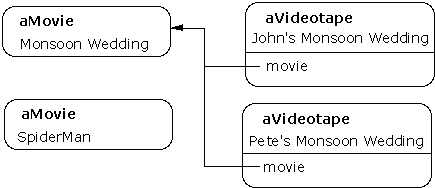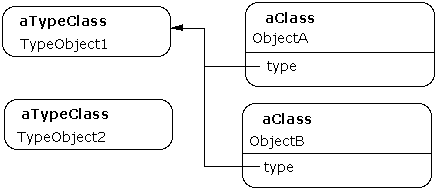
Spring Semester, 2004
Interpreter, Mediator & Type Object
© 2004, All Rights Reserved, SDSU & Roger Whitney
San Diego State University -- This page last updated 01-Apr-04

|
CS 635 Advanced Object-Oriented Design & Programming Spring Semester, 2004 Interpreter, Mediator & Type Object |
|
|---|---|---|
|
© 2004, All Rights Reserved, SDSU & Roger Whitney San Diego State University -- This page last updated 01-Apr-04 |
Interpreter
Given a language, define a representation for its grammar along with an interpreter that uses the representation to interpret sentences in the language
Structure
Given a language defined by a simple grammar with rules like:
R ::= R1 R2 ... Rn
you create a class for each rule
The classes can be used to construct a tree that represents elements of the language
Example - Boolean Expressions
BooleanExpression ::= Variable | Constant | Or | And | Not | BooleanExpression
And ::= BooleanExpression ‘and’ BooleanExpression Or ::= BooleanExpression ‘or’ BooleanExpression Not ::= ‘not’ BooleanExpression
Constant ::= ‘true’ | ‘false’ Variable ::= String
public interface BooleanExpression{ public boolean evaluate( Context values ); public BooleanExpression replace( String varName, BooleanExpression replacement ); public Object clone(); public String toString(); }
Sample Use
public class Test { public static void main( String args[] ) throws Exception { BooleanExpression left = new Or( Constant.getTrue(), Variable.get( "x" ) ); BooleanExpression right = new And( Variable.get( "w" ), Variable.get( "x" ) ); BooleanExpression all = new And( left, right ); System.out.println( all ); Context values = new Context(); values.setValue( "x", true ); values.setValue( "w", false ); System.out.println( all.evaluate( values ) ); System.out.println( all.replace( "x", right ) ); } }
Output ((true or x) and (w and x))
false
((true or (w and x)) and (w and (w and x)))
And
And ::= BooleanExpression ‘&&’ BooleanExpression
public class And implements BooleanExpression { private BooleanExpression leftOperand; private BooleanExpression rightOperand; public And( BooleanExpression leftOperand, BooleanExpression rightOperand) { this.leftOperand = leftOperand; this.rightOperand = rightOperand; } public boolean evaluate( Context values ) { return leftOperand.evaluate( values ) && rightOperand.evaluate( values ); } public BooleanExpression replace( String varName, BooleanExpression replacement ) { return new And( leftOperand.replace( varName, replacement), rightOperand.replace( varName, replacement) ); } public Object clone() { return new And( (BooleanExpression) leftOperand.clone( ), (BooleanExpression)rightOperand.clone( ) ); } public String toString(){ return "(" + leftOperand.toString() + " and " + rightOperand.toString() + ")"; } }
Or
Or ::= BooleanExpression ‘or’ BooleanExpression
public class Or implements BooleanExpression { private BooleanExpression leftOperand; private BooleanExpression rightOperand; public Or( BooleanExpression leftOperand, BooleanExpression rightOperand) { this.leftOperand = leftOperand; this.rightOperand = rightOperand; } public boolean evaluate( Context values ) { return leftOperand.evaluate( values ) || rightOperand.evaluate( values ); } public BooleanExpression replace( String varName, BooleanExpression replacement ) { return new Or( leftOperand.replace( varName, replacement), rightOperand.replace( varName, replacement) ); } public Object clone() { return new Or( (BooleanExpression) leftOperand.clone( ), (BooleanExpression)rightOperand.clone( ) ); } public String toString() { return "(" + leftOperand.toString() + " or " + rightOperand.toString() + ")"; } }
Not
Not ::= ‘not’ BooleanExpression
public class Not implements BooleanExpression { private BooleanExpression operand; public Not( BooleanExpression operand) { this.operand = operand; } public boolean evaluate( Context values ) { return ! operand.evaluate( values ); } public BooleanExpression replace( String varName, BooleanExpression replacement ) { return new Not( operand.replace( varName, replacement) ); } public Object clone() { return new Not( (BooleanExpression) operand.clone( ) ); } public String toString() { return "( not " + operand.toString() + ")"; }
Constant Constant ::= ‘true’ | ‘false’
public class Constant implements BooleanExpression { private boolean value; private static Constant True = new Constant( true ); private static Constant False = new Constant( false ); public static Constant getTrue() { return True; } public static Constant getFalse(){ return False; } private Constant( boolean value) { this.value = value; } public boolean evaluate( Context values ) { return value; } public BooleanExpression replace( String varName, BooleanExpression replacement ) { return this; } public Object clone() { return this; } public String toString() { return String.valueOf( value ); } }
Variable Variable ::= String
public class Variable implements BooleanExpression { private static Hashtable flyWeights = new Hashtable(); private String name; public static Variable get( String name ) { if ( ! flyWeights.contains( name )) flyWeights.put( name , new Variable( name )); return (Variable) flyWeights.get( name ); } private Variable( String name ) { this.name = name; } public boolean evaluate( Context values ) { return values.getValue( name ); } public BooleanExpression replace( String varName, BooleanExpression replacement ) { if ( varName.equals( name ) ) return (BooleanExpression) replacement.clone(); else return this; } public Object clone() { return this; } public String toString() { return name; } }
Context
public class Context { Hashtable values = new Hashtable(); public boolean getValue( String variableName ) { Boolean wrappedValue = (Boolean) values.get( variableName ); return wrappedValue.booleanValue(); } public void setValue( String variableName, boolean value ) { values.put( variableName, new Boolean( value ) ); } }
Consequences
It's easy to change and extend the grammar
Implementing the grammar is easy
Complex grammars are hard to maintain
Adding new ways to interpret expressions
Mediator
A mediator is responsible for controlling and coordinating the interactions of a group of objects (not data structures)
Structure
Classes
Objects
Participants
Mediator
Motivating Example
Dialog Boxes
Objects
Interaction
How does this differ from a God Class?
When to use the Mediator Pattern
When a set of objects communicate in a well-defined but complex ways
When reusing an object is difficult because it refers to and communicates with many other objects
When a behavior that's distributed between several classes should be customizable without a lot of subclassing
Issues
How do Colleagues and Mediators Communicate?
1) Explicit methods in Mediator
class DialogDirector { private Button ok; private Button cancel; private ListBox courses; public void ListBoxItemSelected() { blah} public void ListBoxScrolled() { blah } etc. }
2) Generic change method
class DialogDirector { private Button ok; private Button cancel; private ListBox courses; public void widgetChanged( Object changedWidget) { if ( changedWidget == ok ) blah else if ( changedWidget == cancel ) more blah else if ( changedWidget == courses ) even more blah } }
3) Generic change method overloaded
class DialogDirector { private Button ok; private Button cancel; private ListBox courses; public void widgetChanged( Button changedWidget) { if ( changedWidget == ok ) blah else if ( changedWidget == cancel ) more blah } public void widgetChanged( ListBox changedWidget) { now find out how it changed and respond properly } }
Differences from Facade
Facade does not add any functionality, Mediator does
Subsystem components are not aware of Facade
Mediator's colleagues are aware of Mediator and interact with it
Type Object
Intent
Decouples instances from their classes so those classes can be implemented as instances of a class
Motivation
Video Rental Store Inventory
Need to keep track of all the movies in the inventory
What

Type Object Solution
Class Structure

Object Structure

Type Object Structure

TypeClass (Movie)
